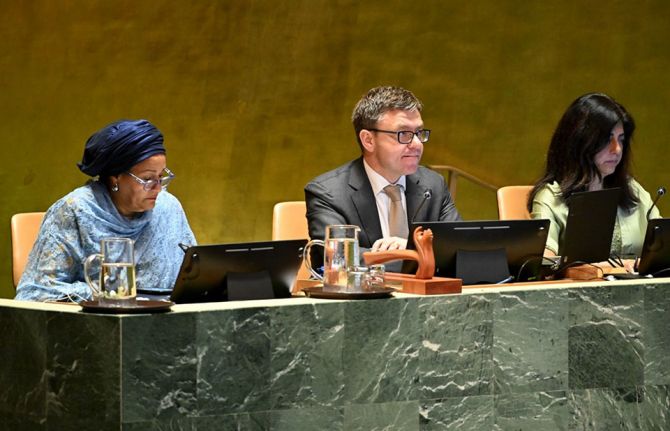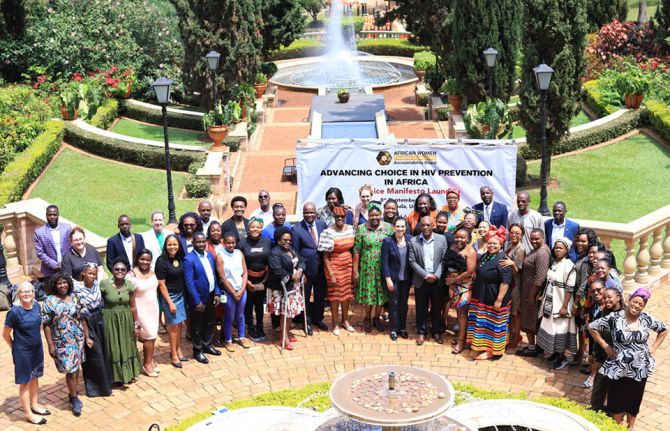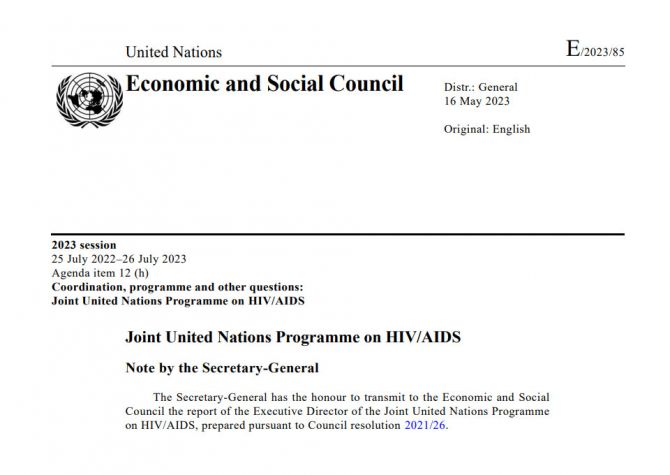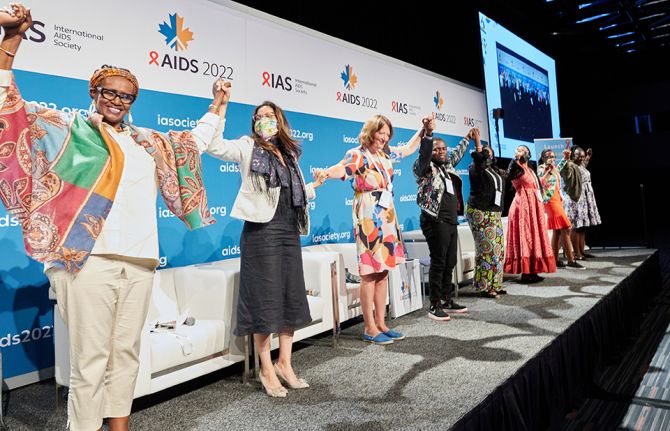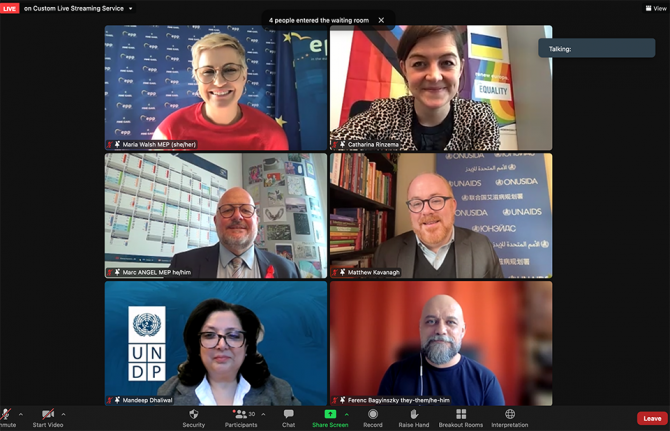
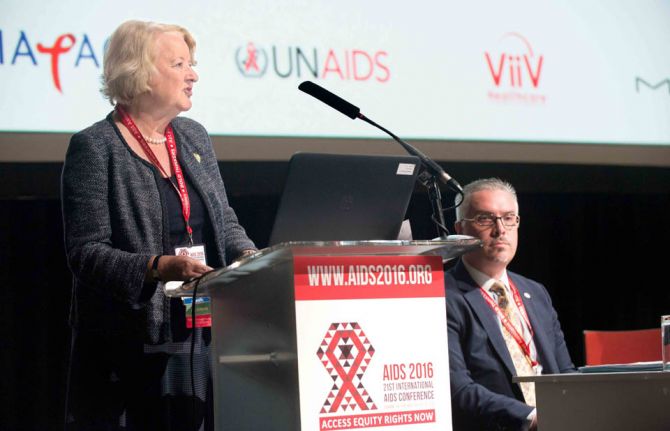
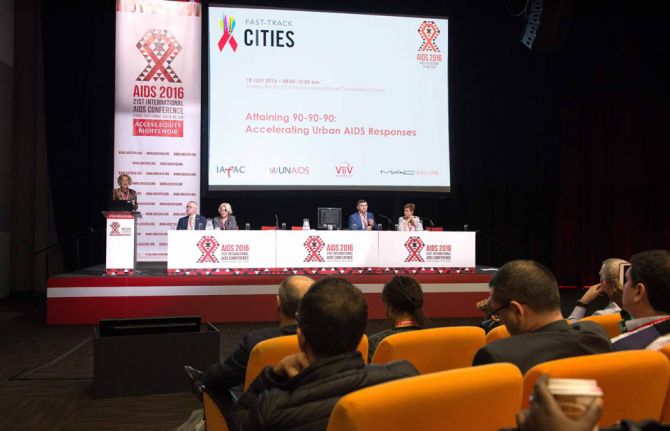
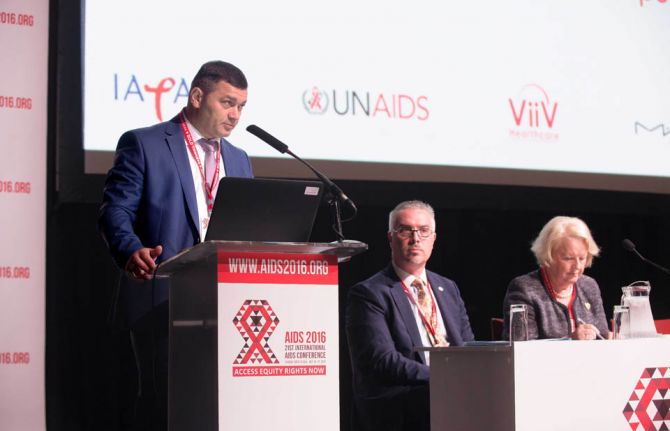
Update
Fast-Track cities reaching the 90–90–90 targets
18 July 2016
18 July 2016 18 July 2016Fast-Track cities are making tangible progress towards the 90–90–90 targets of 90% of people living with HIV knowing their HIV status, 90% of people who know their HIV-positive status accessing treatment and 90% of people on treatment having suppressed viral loads.
Four signatories to the Paris Declaration on Fast-Track Cities released data today demonstrating significant progress towards achieving the 90–90–90 targets and confirming their commitment to ending AIDS in their cities. The announcement was made at a satellite meeting cohosted by the International Association of Providers of AIDS Care (IAPAC) and UNAIDS at the 21st International AIDS Conference, taking place in Durban, South Africa.
Amsterdam, Denver, Paris and Kyiv announced their 90–90–90 data as part of the Fast-Track approach by cities around the world to reach ambitious goals by 2020 in order to end the AIDS epidemic by 2030. Achieving these goals requires accelerated and focused action, innovation in service delivery and working in partnership with key stakeholders and affected populations.
IAPAC has launched a Fast-Track cities web portal with dashboards for five cities: Amsterdam, Netherlands; Denver, United States of America; Kyiv, Ukraine; Paris, France; and San Francisco, United States. The dashboards include data on cities’ progress in reaching the 90–90–90 targets for 2020 and their broader response to HIV. The dashboards can be seen at www.Fast-TrackCities.org.
Quotes
“People must be at the centre of the response to HIV in urban settings to reach the 90–90–90 targets. City health systems that are inclusive and accessible have the best chance of engaging people who might otherwise be left behind, including young women and adolescent girls and key populations—gay men and other men who have sex with men, transgender people, sex workers and their clients, people who inject drugs and prisoners.”
“Attaining the 90–90–90 and zero discrimination and stigma targets in high HIV burden cities is grounded in data-driven HIV care continuum optimization that aims to leave no one behind and holds stakeholders accountable.”
Resources

Update
Activists call for ending unjust HIV criminalization
18 July 2016
18 July 2016 18 July 2016On 17 July, some 200 people living with HIV, human rights activists and representatives of key populations gathered for a one-day meeting on challenging HIV criminalization under the title “Beyond blame: challenging HIV criminalization.” The event, a preconference meeting before the 21st International AIDS Conference, being held in Durban, South Africa, was organized by HIV Justice Worldwide, an international partnership of organizations, including the AIDS and Rights Alliance for Southern Africa, the Canadian HIV/AIDS Legal Network, the Global Network of People Living with HIV, the HIV Justice Network, the International Community of Women Living with HIV, the Positive Women’s Network USA and the Sero Project.
The event was an opportunity for people working to end unjust HIV criminalization in all regions of the world to share recent developments, successful approaches and challenges. It also mobilized participants on the urgency to address unjust HIV criminalization as a violation of human rights and serious barrier to efforts to scale up HIV prevention, treatment and care services.
The meeting heard individuals who have face HIV criminalization recount the far-reaching personal, social and legal impacts of unjust prosecution on their lives and that of their families. Lawyers and civil society activists who have led successful efforts against HIV criminalization, including in Australia, Canada, Kenya, Sweden and the United States of America, shared their experiences and approaches. HIV scientists and clinicians were called upon to become more involved in efforts to ensure that the application of the criminal law is consistent with best available evidence relating to risk, harm and proof in the context of HIV. Similarly, members of parliament and the judiciary were highlighted as key stakeholders whose understanding and engagement is central to efforts to end unjust HIV criminalization.
Quotes
“HIV-related prosecutions are becoming increasingly commonplace. The evidence that criminalization as a public health strategy does not work is too plain to contest. It is our responsibility to end it.”
“HIV criminalization is profoundly bad policy. It is based on fear and outdated understanding of HIV risk and harm. Criminalization magnifies stigma and discrimination towards people living with HIV. People living with HIV have been at the forefront of efforts to end unjust criminalization and should be commended for their courage and commitment to justice.”
“My life will not be the same after facing HIV criminalization. My 30 years working as a nurse and dedicated to saving lives have been erased. I have spent almost a year in prison. I have been branded a criminal and a killer even though I have harmed no one.”
Related

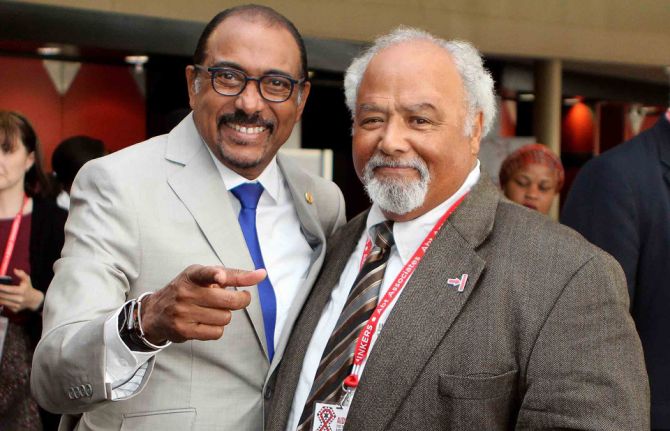
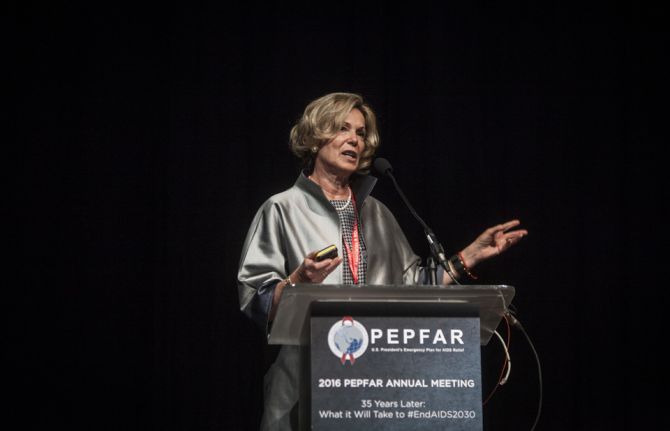
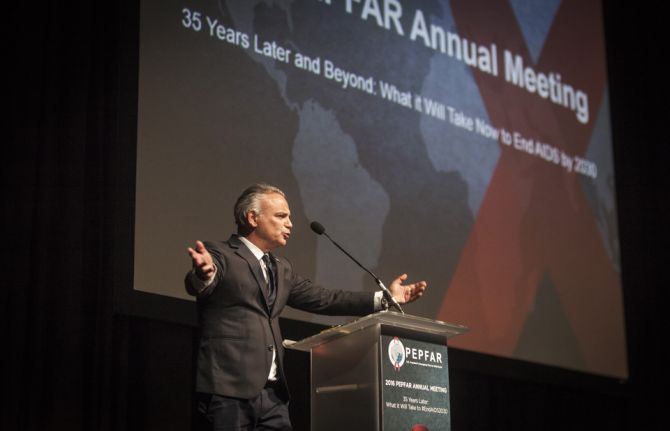
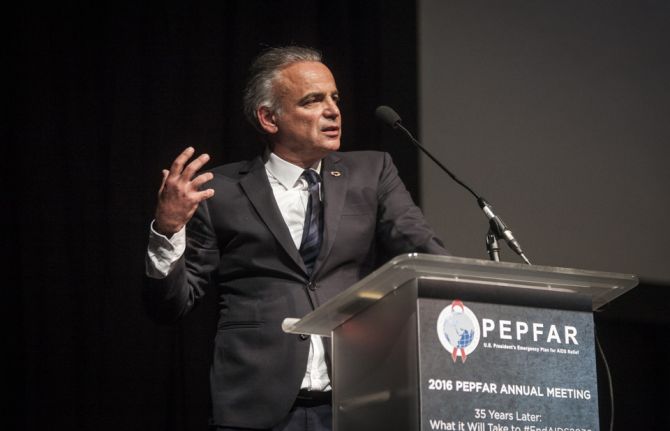
Update
PEPFAR annual meeting
18 July 2016
18 July 2016 18 July 2016On 16 July, UNAIDS Executive Director Michel Sidibé joined Deborah Birx, the United States Global AIDS Coordinator and Special Representative for Global Health Diplomacy, in opening the United States President’s Emergency Plan for AIDS Relief (PEPFAR) annual meeting, which this year was held in Durban, South Africa, immediately prior to the 21st International AIDS Conference.
Mr Sidibé offered opening remarks in a session entitled, “Leadership, diplomacy, and partnership to move policy to practice.” He was joined at the podium by Tony Fauci, of the United States National Institutes of Health, and Eric Goosby, the United Nations Secretary-General’s Special Envoy for Tuberculosis. Addressing the group, which included PEPFAR staff, civil society, national governments and multilateral organizations, Mr Sidibé reminded participants that when the conference was last held in Durban, few people had access to treatment, but now, through the power of science, medicine and social change, the reality had changed.
In describing PEPFAR’s goals for the next year, Ms Birx noted her commitment to the Fast-Track response, including dramatically scaling up access to treatment. Projections show that by the end of 2017, seven PEPFAR-supported countries should reach the first two of the three 90–90–90 targets (i.e. 90% of people living with HIV tested and 90% of people tested accessing antiretroviral therapy).
Additional sessions during the annual meeting focused on the role of communities, key populations, prevention for young women and girls and country action to adopt the World Health Organization’s test-and-start guidelines.
Speaking to the closing session of the meeting, Luiz Loures, UNAIDS Deputy Executive Director, pledged UNAIDS’ continuing commitment to working in full partnership with PEPFAR, civil society and affected communities to ensure that this moment to drive rapid progress towards the Fast-Track Targets is not lost.
Quotes
“Through a people-centred approach, we have broken the conspiracy of silence. The work of the United States President’s Emergency Plan for AIDS Relief has helped save millions of lives.”
Related

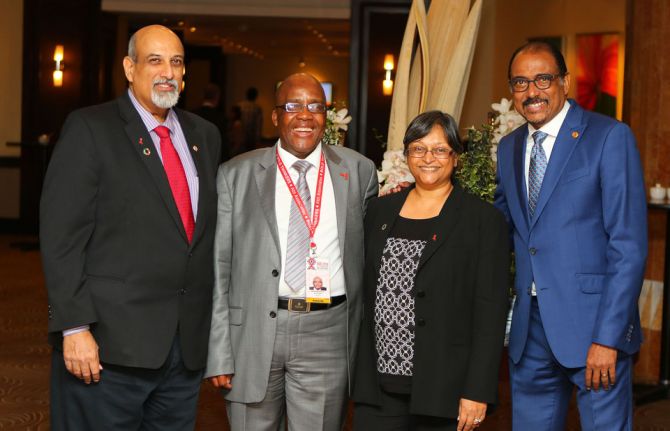
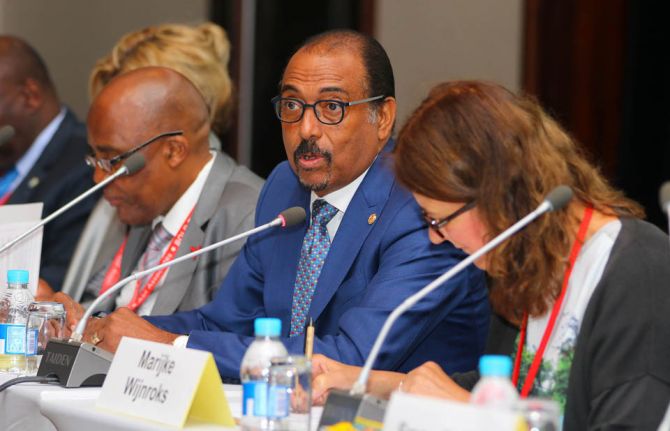
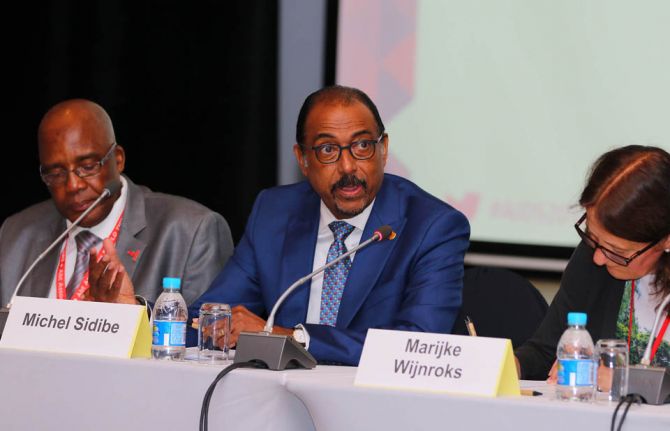
Update
Putting a quarter for HIV prevention firmly on the global agenda
18 July 2016
18 July 2016 18 July 2016The newly launched a quarter for HIV prevention campaign, which calls for investment in effective prevention programmes to be increased to at least 25% of global HIV resources, is gathering momentum.
In order to help harness this momentum, UNAIDS and the World Bank co-organized an event at the 21st International AIDS Conference, being held in Durban, South Africa, with a high-level panel, including UNAIDS Executive Director Michel Sidibé, Deborah Birx, United States Global AIDS Coordinator and Special Representative for Global Health Diplomacy, ministers of health of South Africa, Swaziland and Zimbabwe, leaders of national AIDS programmes and representatives of the Global Fund to Fight AIDS, Tuberculosis and Malaria and civil society. The event, which took place on 17 July, was moderated by David Wilson, the World Bank’s Global AIDS Programme Director.
Focusing on the challenges and opportunities to scale up HIV prevention programmes, the participants shared ideas and experiences, examining ways to ensure both the availability of sufficient investment and that key populations, women and young people are not left behind.
The meeting also highlighted the need to address behavioural and structural, in addition to biomedical, factors.
It was argued that only a redoubling of prevention efforts could address the worrying trend of new HIV infections among adults having failed to decline for at least five years, a trend highlighted in the new UNAIDS Prevention gap report. Although great strides have been made in treatment and reductions in mortality, participants agreed that treatment alone cannot bring about the end of the AIDS epidemic.
In helping to chart a concrete way forward, the panellists suggested a series of next steps towards scaling up prevention plans and programmes and making sure that a quarter for HIV prevention becomes a reality.
Quotes
“The 90–90–90 targets should be combined with comprehensive prevention and we have key prevention pillars covering combination prevention for young women and adolescent girls, programmes for key populations, access to condoms for all, voluntarily medical male circumcision and pre-exposure prophylaxis.”
“It is obvious that our success has so far relied on biomedical interventions. The biggest challenge the world has to deal with now is social and behavioural prevention interventions. This is our new focus.”
‘The real issue we have before us is demographics and epidemiology. Better data will help us focus on the right populations in the right locations. We need a similar commitment for and rigour with data on prevention as on treatment.”
“We need to be able to get to the populations at risk and empower them with the ability to demand access to prevention services.”

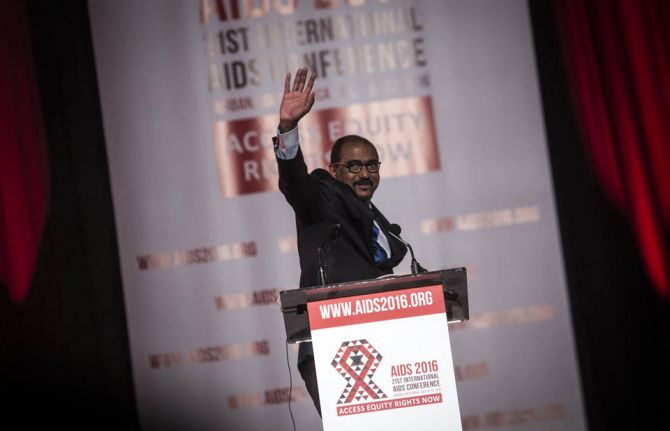
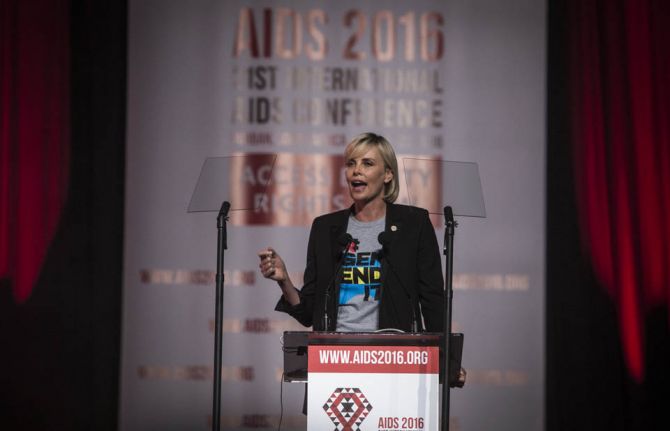
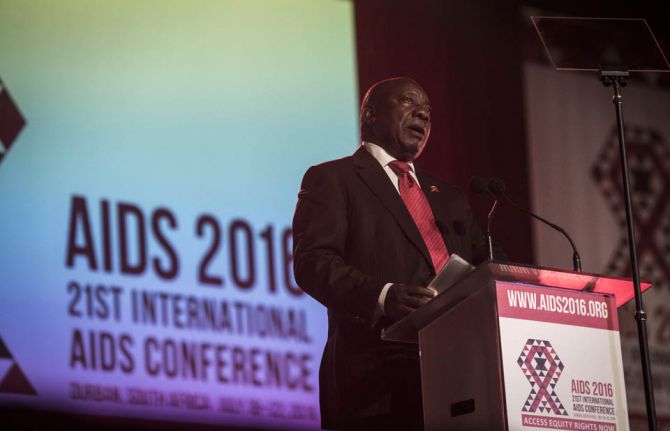
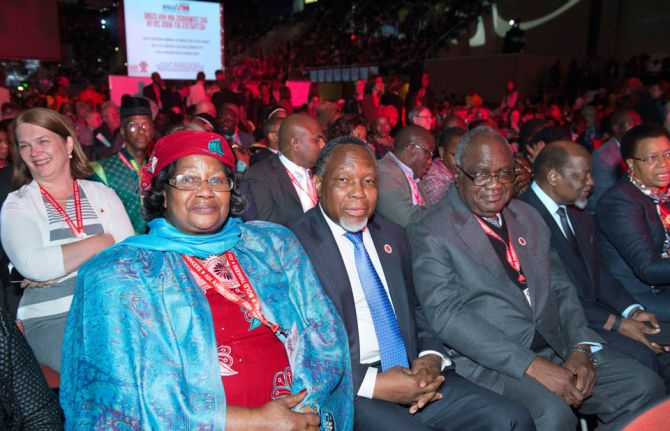

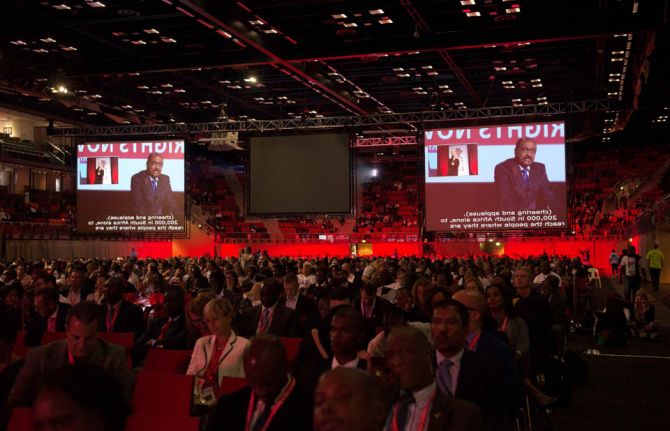
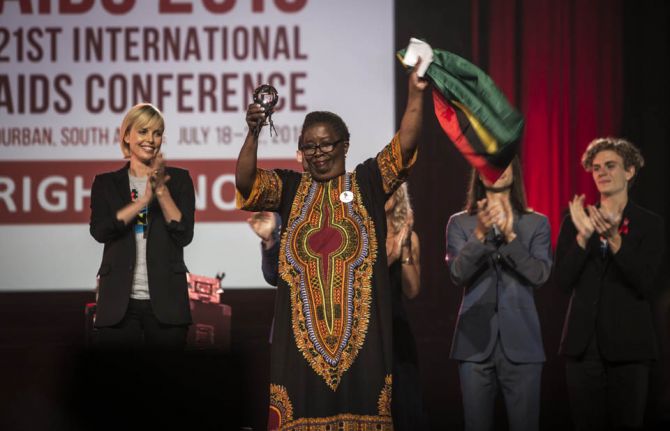
Update
21st International AIDS Conference opens in Durban
19 July 2016
19 July 2016 19 July 2016The 21st International AIDS Conference opened on 18 July in Durban, South Africa. Under the theme “Access equity rights now,” the conference echoes UNAIDS’ call to leave no one behind and provide comprehensive HIV services to everyone in need.
AIDS 2016 brings together some 18 000 delegates from 183 countries to work to strengthen not only HIV treatment, prevention, care and support programmes, but also the commitment to evidence-informed HIV research, overcoming the marginalization of vulnerable populations, challenging discriminatory laws and championing a community-centred and rights-based response to HIV.
The conference was officially opened on Monday evening by South Africa’s Deputy President, Cyril Ramaphosa, UNAIDS Executive Director Michel Sidibé, United Nations Messenger of Peace and actress Charlize Theron, Archbishop Desmond Tutu, AIDS 2016 Co-Chairs Olive Shisana and Chris Beyrer and Nkhensani Mavasa of South Africa’s Treatment Action Campaign.
During the opening ceremony, Mr Ramaphosa presented Mr Sidibé with an award recognizing his contribution to South Africa’s progress in the AIDS response.
AIDS 2016 is set to emphasize the need to build partnerships, promote community mobilization to hold leaders accountable and ensure that HIV is at the heart of the 2030 Agenda for Sustainable Development. In addition, the conference will, as always, provide a showcase for experts to present new research findings, scientific developments and best practices in programme implementation.
During the coming days there will be myriad opportunities for sharing knowledge, ideas and good practices through plenary discussions, abstract presentations, symposia, skills-building workshops, attendance at the Global Village community space and numerous independent events.
AIDS 2016 runs from 18 to 22 July.
Quotes
“In 2000, people came here demanding respect, rights and dignity. They came to demand access to HIV services. It is fitting, on Nelson Mandela Day, that we are back in Durban to challenge the world again.”
“HIV is not only transmitted by sex. It is transmitted by sexism, racism, poverty and homophobia. If we are going to end AIDS, we must cure the disease in our hearts and minds first.”
“As long as new HIV infections continue to occur and HIV services are denied, it is too soon to declare victory. This is one fight and we are all in it together. Let us use AIDS 2016 to bring our movements together.”
“We [civil society] are not the enemy here—complacency and corruption are. We cannot reach the 90–90–90 targets if we turn a blind eye to corrupt leaders around the world.”

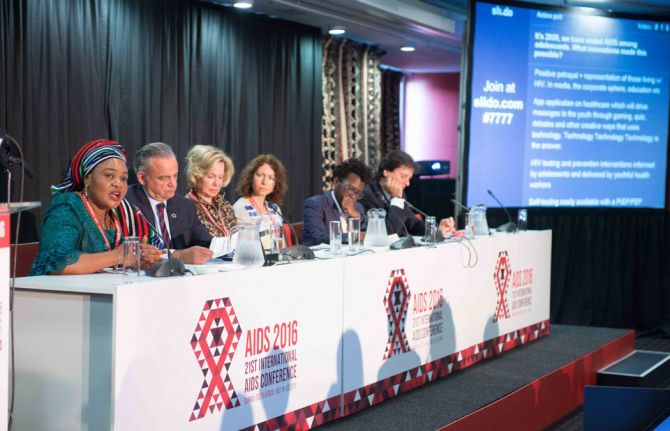
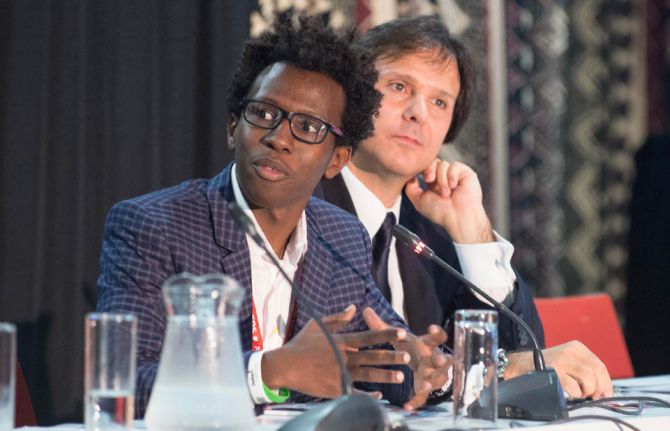
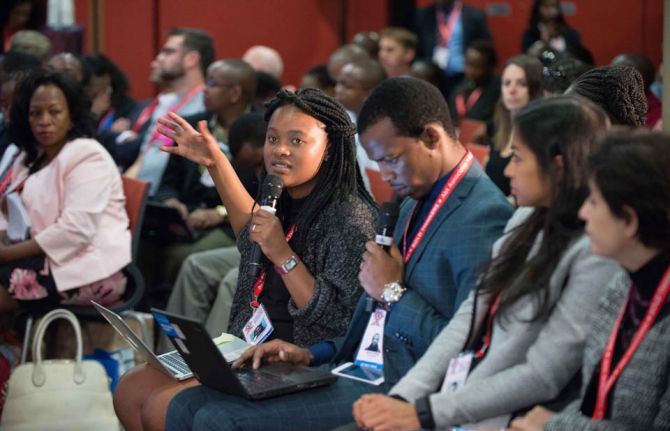
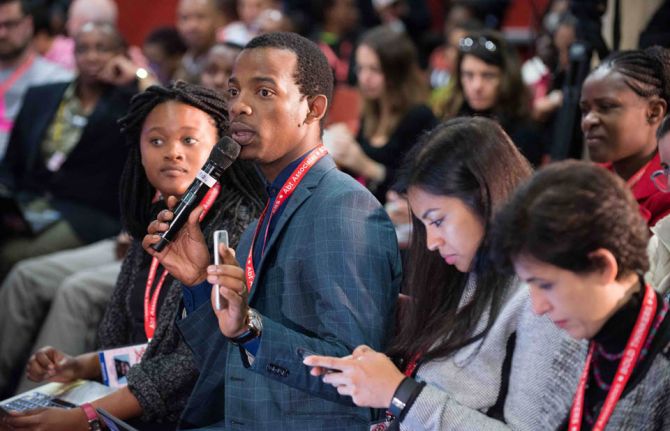
Update
Creating an AIDS-free generation with and for adolescents
18 July 2016
18 July 2016 18 July 2016Innovation has played a key role in advancing the response to AIDS, and continued investments in innovative solutions will be vital to ending AIDS among adolescents by 2030. An event hosted by the South African Ministry of Health and the United Nations Children’s Fund at the 21st International AIDS Conference, taking place in Durban, South Africa, from 18 to 22 July, brought together representatives of the media, donors, governments and youth.
Participants at the event, held on 18 July and entitled “Creating an AIDS-free generation with and for adolescents: predict the future by creating it,” noted that there is a great potential for paradigm shifts and improved outcomes for adolescents. The development of new rapid diagnostic testing and antiretroviral therapies has already changed the landscape.
Youth vlogger Siyanda Mohutsiwa and disc jockey Zakes Bantwini opened the session, which was moderated by award-winning journalist Iman Rappetti, and shared their experiences of working with young people affected by HIV across Africa. While interacting with the audience and engaging with young people around the world through social media, the participants explored five areas of innovation that they believe will contribute to the promise of an AIDS-free generation: mobile money services and digital currencies; unique identifications; transportation and delivery; wearable and sensor technologies; and learning technologies.
At the conclusion, all agreed that innovation is key, as is capitalizing on advances in technology, being prepared to think and do differently, investing in bold initiatives and fostering partnerships with new sectors, especially young people.
Quotes
“Adolescents were absent from the Millennium Development Goals— that's why we failed to address them.”
“We speak about prevention of mother-to-child transmission of HIV, but not about how to stay negative. We seek solutions for a vaccine, but not protecting girls against violence. We have identified the issues, we have found the problems, now we have to find the solutions.”
“Technology provides a platform for young people to share their experiences and feelings. Digital platforms are one way of allowing young people to engage without being judged and to be anonymous.”

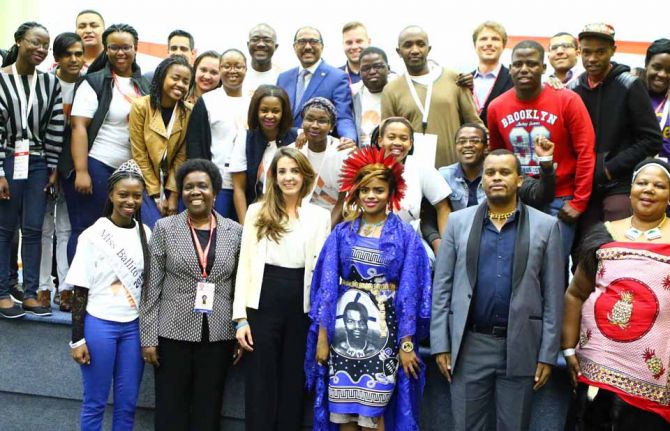


Update
Young people leading the HIV response
17 July 2016
17 July 2016 17 July 2016To ensure that young people have the information and tools required to actively engage in the 21st International AIDS Conference, the Durban Youth Force, a coalition of youth advocates, convened a youth preconference event on 16 and 17 July at the Durban University of Technology.
The event was aimed at providing a platform for young people to acquire skills and get their views reflected in the conference outcome documents, to strengthen dialogue among young people on youth-led accountability for the Sustainable Development Goals, to take stock of youth engagement in the AIDS response and to develop a strategy for transitional leadership within the youth movement.
During the two-day event, a session was held on preparing for the fourth phase of the ACT!2015 initiative, which will run through to December 2017. ACT!2015 is a youth-led social action initiative to inspire a new wave of activism in the AIDS response by using social media and online technology to advance sexual and reproductive health and rights.
Michel Sidibé, the Executive Director of UNAIDS, spoke to the participants about the critical role that young people can play in holding governments accountable for their commitments to the AIDS response and for advancing sexual and reproductive health and rights.
Speakers at the closing session included Princess Tessy of Luxembourg and Princess Sikhanyiso of Swaziland.
Quotes
“Young people must be in the lead in mobilizing their communities, holding their governments to account and finding new ways to monitor the effectiveness of the HIV response to ensure that our programmes and investments are reaching those most in need.”
“My passion, my interest and my commitment to women’s rights, women’s empowerment and women’s health, to sexual and reproductive health and to our right to choice is something that I’ve always had.”
“We must put an end to inequality worldwide. We must leave no one behind.”
“This was the first International AIDS Conference after the adoption of the Sustainable Development Goals, making young people’s strong participation a critical element to advance the AIDS response and ensure access to services, human rights for all and youth-led accountability.”
“We, the young people, now are not only demanding our meaningful engagement but are also working to ensure that our leaders and governments are held accountable for their commitments made for achievement of the 2030 Agenda for Sustainable Development.”
Related
 “Who will protect our young people?”
“Who will protect our young people?”

02 June 2025

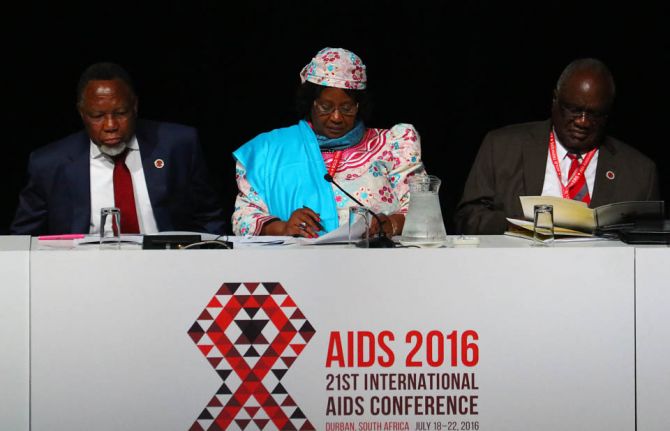

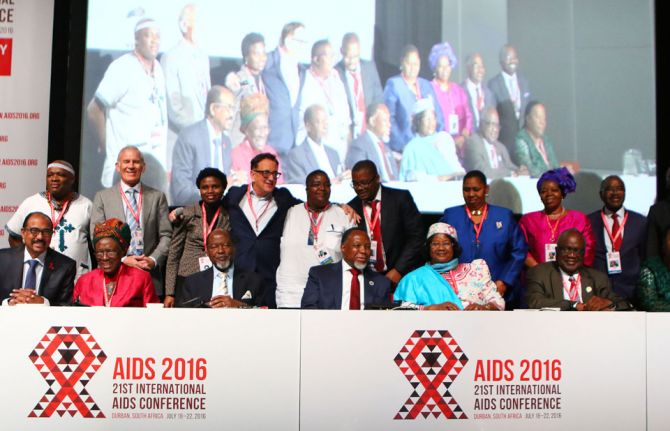
Update
Political leadership is critical to ending the AIDS epidemic
19 July 2016
19 July 2016 19 July 2016Political commitment is an essential component of the AIDS response on the African continent. Most of the gains made on HIV prevention and treatment are a result of a strong partnership between the leaders of government, civil society, the private sector and communities. The role of political leadership was the focus of a high-level dialogue between the Champions for an AIDS-Free Generation in Africa and the Government of South Africa on 19 July, during the 21st International AIDS Conference, being held in Durban, South Africa.
The Champions highlighted some of the key issues that require attention from current political leaders, including poverty, unemployment and gender inequality.
Human rights remain an issue that must be addressed, especially among key populations, as does stigma and discrimination towards people living with HIV. Adolescent girls and young women remain disproportionately affected by HIV in many countries in Africa and the need to retain girls in school and provide them with economic opportunities was highlighted by the Champions.
Quotes
“It’s all about political will. The person in the driver’s seat matters—I am talking about us in the state house. We have to take responsibility and accept that we have obligations to focus on.”
“Without sustained leadership it’s impossible to change the face of the AIDS epidemic.”
“While political leadership is important, on its own it’s not sufficient. There has to be inclusion of leaders from a range of sectors in society, including civil society, labour, the private sector and communities.”

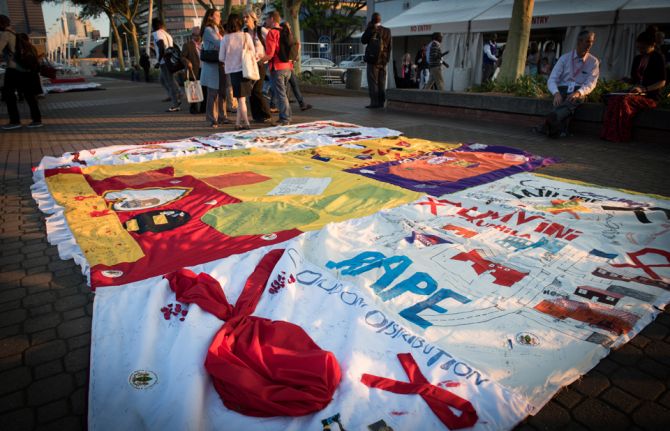
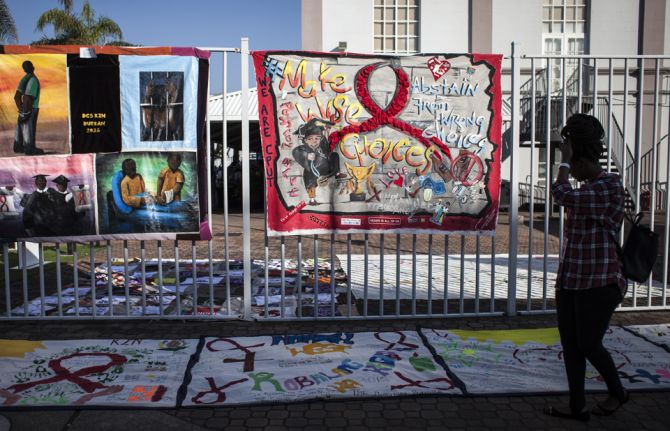
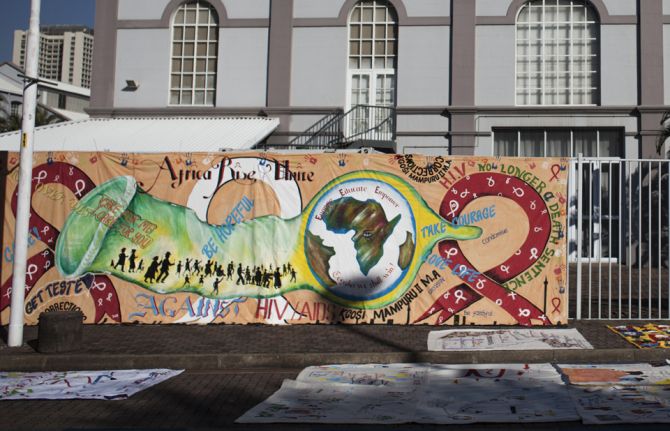
Feature Story
Quilts celebrate South Africa’s journey
22 July 2016
22 July 2016 22 July 2016Quilts of various sizes, colours and shapes ripple like waves by the various entrances to the Durban International Conference Centre, hosting the 21st International AIDS Conference. Laid out or hung up, inscriptions vary from “Empower together we shall win” to “Positive link.” The AIDS Quilt Project is back in South Africa telling the story of the journey from Durban 2000—the last time the AIDS conference took place in the city—to Durban 2016.
In 2000, fewer than one million people had access to life-saving treatment and South Africa had the greatest number of people living with HIV.
“In 2016, we wanted to tell this journey and how we came from a time of loss and death and stigma and discrimination to where we are now, where we can talk about treatment and HIV, and we are much more open,” explained Kanya Ndaki, from the South African National AIDS Council. She added, “The quilts visually tell the story.”
Communities, schools, nongovernmental organizations, the health department and civil society partners submitted their decorated cloth panels from across the country. More than 450 in total were collected. Many grace the grounds of the conference, with a few quilts dating back to 2000.
“Blesser”
One quilt told the story of the sugar daddy phenomenon, known in South Africa as “blessers,” depicted schoolgirls in pigtails with an iPhone in hand and big purses next to a grey-haired man in a fancy car.
Young women and adolescent girls make more than 70% of new HIV infections in Sub-saharan Africa. A rate two and a half times greater than boys of the same age. Many point the finger at the fact that young women are having sex with much older partners unlike their male peers.
Prison story full of optimism
Ms Ndaki proudly showed off a quilt hanging prominently outside the entrance to the Global Village—a space open to the general public. “This quilt came from the Department of Correctional Services, a prison in Pretoria,” she said pointing to the long orange-hued panel. “Care for me, I care for you,” “Take courage,” “Love life” and “Condomize” grace the panel. Initially, prisoners were to sew different panels together, but in the end they designed their very own creation.
“It is a very powerful quilt and it was one of the ones displayed when government officials handed over the quilts to the South African National AIDS Council for the Durban AIDS Conference,” she said as two women posed for selfies with the quilt in the background.
Multimedia

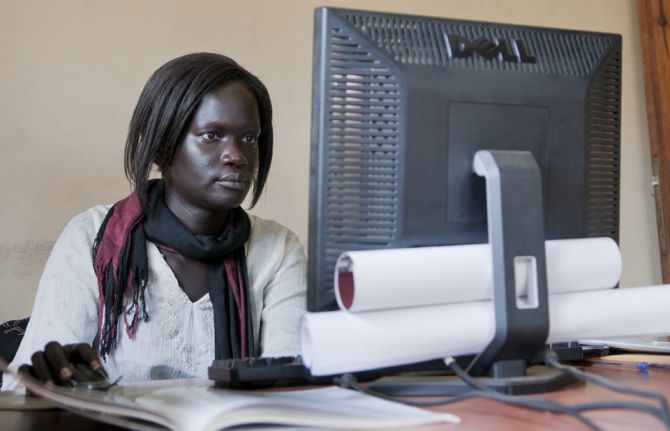
Update
Almost 5 million workers reached under ILO’s VCT@WORK initiative and 3 million tested for HIV
14 July 2016
14 July 2016 14 July 2016The International Labour Organization (ILO) has announced that the initial phase of its VCT@WORK initiative has reached close to 5 million workers with face-to-face education on the benefits of HIV testing. During the outreach, which took place between July 2013 and December 2015, almost 3 million workers were tested for HIV, and more than 85 000 people who tested positive for HIV were referred to services for treatment. The ILO, UNAIDS and partners will present the results of the initiative at the 21st International AIDS Conference, taking place from 18 to 22 July in Durban, South Africa.
Quotes
“For the first time, we have results that clearly demonstrate the impact of a workplace response to HIV. When workers have timely knowledge of their HIV status, they can take the right treatment and continue to be healthy and productive members of the workforce.”
“This is the kind of innovation needed to reach people with HIV services in their everyday lives. This is the Fast-Track response in action—normalizing testing and ensuring more people know their HIV status and are linked with local care and support.”







